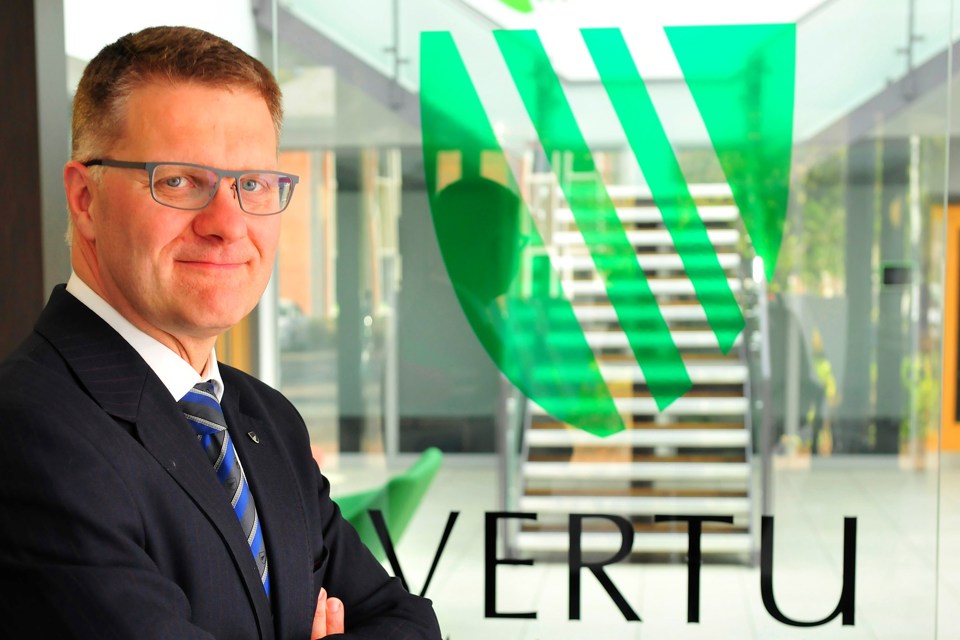Vertu Motors has said that it has “considerable firepower for growth” heading into a new year which presents the threat of lower new car volumes and rising operating costs.
The top AM100 group, which currently has 125 retail and aftersales sites across the UK, has announced that it expects to report growth in turnover and profits in its latest annual results in an update ahead of its preliminary results for the year ended January 31st, 2017.
And it stated that it was well positioned for growth through acquisition after entering into a new five-year banking facility with Barclays Bank plc and The Royal Bank of Scotland plc on February 27th.
The facility provides £40 million of committed borrowing capacity with the potential to add a further £30 million which is currently uncommitted.
Vertu’s statement said: “These new arrangements provide the group with the financial capacity to continue to expand as opportunities arise.”
In its group update, the group revealed revealed a 4.8% like-for-like rise in turnover against the backdrop of a 9.8% like-for-like fall in new car sales volumes during the five month period to January 31st.
Service revenues rose by 6% on a like-for-like basis as used vehicle sales rose 7.8% - with 30% of gross profit earned from used vehicles in the period – and new vehicle sales saw a 9.3% like-for-like decline over the same period.
In its statement, the group blamed the pre-registration trend for a fall in new car sales which saw it “lag behind” SMMT figures for the period.
It said: “As the private new vehicle market has softened, there have been higher levels of self-registration of vehicles by retailers to bridge the gap between genuine retail demand and the volume aspirations of manufacturers.
“These vehicles are registered as ‘retail’ as measured by the SMMT registration data and are then sold to customers as used cars. In these circumstances the Group's new retail sales volume trends will tend to lag the SMMT registration data.
“The Group's strategy during this period has been to work to achieve Manufacturer performance targets at high levels while also maintaining strong pricing disciplines.”
The decline in new car sales was offset by higher like-for-like gross margins which strengthened from 7.9% to 8%.
Vertu reported that its predictions for 2017 tally with predictions of a 5% fall in new car registrations, but it expects to achieve growth in used cars and aftersales, with over 10,000 customers already signed up to service plans.
For the five-month period to January 31st, the group benefitted from high quality, recurring, high margin aftersales business with like-for-like gross profits growth of 6.9% representing a seventh consecutive year of similar growth.
In all, 38.2% of gross profit in the five month period was earned from aftersales.
Commenting on the five-month period which was the subject of the group update, Vertu chief executive Robert Forrester said: "We are delighted with the group's performance during the period, particularly in used vehicles and our high margin aftersales business and we expect our full year results to show continued growth in revenues and profits.
“Vertu has an excellent team, a strong balance sheet and a proven growth strategy, and as such the Board is confident of the Group's future prospects."
Vertu's fleet car business returned to growth during the five months to January 31st, with like-for-like sales volumes increasing by 6.1%, ahead of the UK market growth of 4.1% (SMMT).
A changing mix between car and van sales resulted in a reduction in like-for-like fleet and commercial margins to 3.1% (2016: 3.3%), however.
While Vertu’s statement said that the business had maintained the ratio of operating expenses to revenue in the period at 9.7%, it did highlight the introduction of further taxes such as the apprenticeship levy, increases in the minimum wage rates and well documented rises in business rates as renewed pressures on operating costs.
It stated: “The group is maintaining strong cost control disciplines and a focus upon productivity improvement in all areas of the business to seek to mitigate these effects.”















Login to comment
Comments
No comments have been made yet.